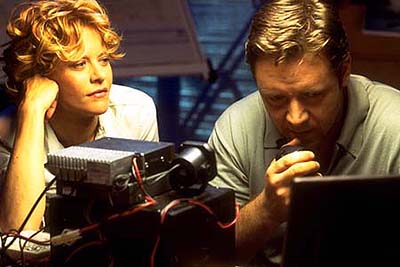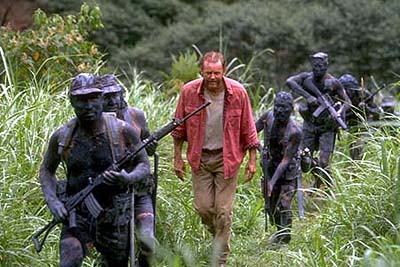

Proof of Life has attracted much unwanted and unintentional attention prior to its opening. First, Will Gaffney, a stand-in for David Morse, died accidentally on location in Ecuador. Second was the soap opera concerning stars Meg Ryan, Russell Crowe, and Ryan's husband Dennis Quaid. Because of the latter, watching Proof of Life can be a strange experience, looking for any signs of actual chemistry in the on-screen interaction between Ryan and Crowe. This point also caused some last minute editing, changing the editing between the two.
The title refers to some proof that a kidnapped person is alive. Peter Bowman (David Morse, Dancer in the Dark, Bait), an engineer working in Latin America is the victim. He is building a dam for a large multinational oil company. His wife, Alice (Ryan, Hanging Up, You've Got Mail) is an ex-hippie, and both of them are dealing with some issues in their marriage. Terry Thorne (Crowe, Gladiator, The Insider) is the designated 'K&R' (kidnapping and ransom) consultant brought in to recover Peter.
The Vanity Fair article "Adventures in the Ransom Trade" by William Prochnau inspired this movie, written by Tony Gilroy (The Cutting Edge). Gilroy and director Taylor Hackford (The Devil's Advocate) switch back and forth between Thorne's attempt to negotiate with the kidnappers and Bowman's attempts to survive. Little does he know that the kidnappers, although they constantly threaten him, are highly unlikely to kill him. Thorne knows that the situation is all about money, and boils down to a prolonged negotiation.
The main issue is that Proof of Life is trying to be too many things. The script cannot decide exactly how far to take the non-relationship between Alice and Thorne. This seriously cuts much of the tension in the rescue theme of the movie. In addition, except for some cryptic hints in an argument at the beginning of the movie, there is no context to the Bowman marriage. No one can tell is the marriage is strained, causing Alice to easily turn to Thorne, or if the marriage is strong, making the attraction to Thorne more forbidden and more of an internal power struggle. Hackford intersperses some frenetic action sequences with long periods of negotiation. The action scenes work, but seem to happen suddenly and only for the purpose of forwarding the movie. Everything in Proof of Life seems standard, and not enough to fully engage the viewer's attention.
As always, Crowe cuts an imposing figure. So does David Caruso (Jade, Body Count). And where the heck has he been? Morse also is also usually a towering figure, but here undergoes an obvious change in physical and mental character (among other things, a weight loss consultant gets a credit). Morse in currently an underrated actor, not getting the credit he deserves. His last three roles are strikingly different, and just show how versatile he can be. Crowe displays the same relentlessness and barely contained rage that highlight his other performances. He seems ready to explode at any moment, and when he's making threats, they sound real. Ryan does not quite fit as the worried wife. Her character veers from independent to helpless, the latter not fitting with the description of her personality and background. So while the acting may be good, the circumstances around Proof of Life are far more interesting (tragic/sad/tabloid) than the film itself.